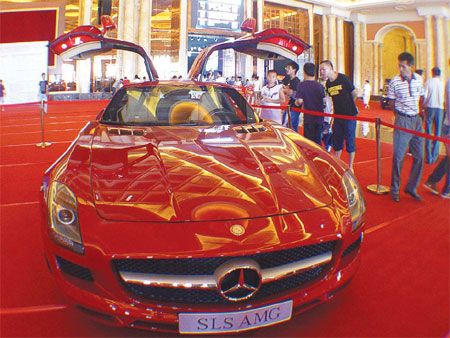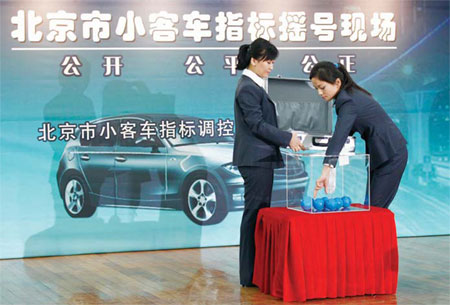China market retained auto sales crown
 0 Comment(s)
0 Comment(s) Print
Print E-mail
China Daily, January 9, 2012
E-mail
China Daily, January 9, 2012
Editor's note: It was another eventful year for China's auto industry as the market remained the largest in the world - but also faced a string of challenges.
Incentives expire
After two years of explosive growth, China's auto market cooled in 2011 as government tax rebates for small cars, trade-in subsidies and incentives for rural buyers expired.
Full-year vehicle production and sales numbers will be released today by the China Association of Automobile Manufacturers. Both figures are expected to range between 18 and 19 million, increases of just 2 to 3 percent compared with the remarkable growth of 2010.
 |
|
A Mercedes-Benz SLS AMG on show in Hainan province. [China Daily] |
 |
|
A lottery drawing for car license plates in Beijing started in January last year.[Photo/China Daily] |
Vehicle production and sales both hit 18 million units in 2010, a surge of 32 percent over 2009.
In the capital city Beijing, where restrictions on new car license plates took effect at the first of the year, new car sales plummeted to less than half of the 800,000 sold in 2010.
Premium boom
China's luxury car sales continued strong growth in 2011 despite increasing external market pressures.
Segment leader Audi sold more than 310,000 vehicles in China last year, breaking the 300,000 benchmark for the first time. The number for the first time outstripped the company's sales in its home market.
The carmaker plans to more than double its yearly output in China to 700,000 units after 2015.
German premium brands BMW and Mercedes-Benz also performed well last year. Both are building capacity for long-term development and adding new products to their local lineups.
In December they began small-volume export of long-wheelbase cars originally tailored for Chinese consumers and only built at their joint ventures in China. It was the first time China-made luxury vehicles were shipped abroad.
Failed bids for Saab
Efforts by Chinese companies to buy the cash-strapped Swedish brand Saab continued throughout 2010, but ultimately failed after the carmaker filed for bankruptcy on Dec 19.
Hawtai Motor, a small domestic manufacturer of SUVs and cars, first reached an agreement to buy a stake in Saab in May, but gave up after it was unable to gain approval from Chinese regulators.
Another automaker, Zhejiang Youngman Lotus Automobile Co Ltd, and car dealer Pang Da Automobile Trade Co then jointly bid for the failed carmaker, inking an non-binding agreement in June with Swedish Automobile NV, the parent company of Saab, to buy a majority interest.
Both buyers and Swan agreed in October to change the plan to 100 percent of Saab.
But the bid was rebuffed by General Motors, former owner of Saab, which still owns preferred shares and key patents. GM then stood its ground and refused yet another proposal, this time from Youngman and an unnamed Chinese bank that had replaced Pang Da.
Pang Da had already handed over 45 million euros to Saab as a deposit, while Youngman spent even more to pay Saab debts.
While the actual loss remained unclear pending the outcome of bankruptcy proceedings, analysts said Chinese companies should learn from the example and be careful of risks in overseas acquisitions.
New brands at JVs
Foreign carmakers are developing new, local brands with their Chinese partners to tap the potential of entry-level, low-priced cars in China.
In March Guangqi Honda Automobile Co rolled out the first model under an entirely new brand created for the Chinese market - the Everus - that went on sale at the Shanghai auto show in April at prices from 70,000 to 100,000 yuan.
In the same month, a small family car with the new nameplate Baojun developed at General Motors' three-way tie up SAIC-GM-Wuling also went on sale priced at less than 80,000 yuan.
Nissan's joint venture with domestic carmaker Dongfeng unveiled the first model under a new brand Venucia at the Guangzhou auto show in November. The product is set to hit the market this year.
Other carmakers, including Volkswagen and Hyundai, also have plans for local brands, with their projected new products expected to be electric vehicles.
The new brands by Sino-foreign joint ventures triggered debate inside the industry. Some noted the trend helps local carmakers deepen their involvement in design and engineering, but others claimed most models are based on outdated products without much technological innovation.
Due to their competitive pricing, the new brands will also likely squeeze the market share of domestic carmakers including Geely, Chery and BYD.






Go to Forum >>0 Comment(s)